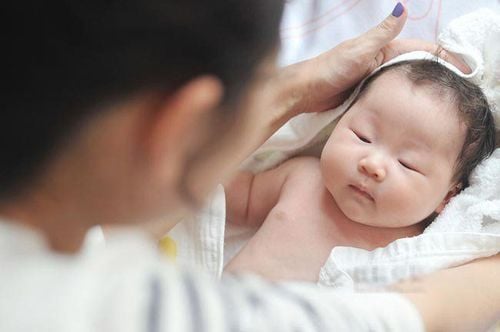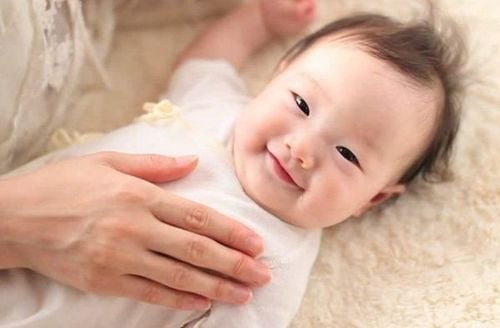This is an automatically translated article.
The article was professionally consulted with Specialist Doctor I Dang Thi Ngoc Chuong - Pediatrician - Pediatrics - Neonatal Department, Vinmec Central Park International General Hospital.Head banging in babies is very common, especially in boys between the ages of 18-24 months. This seemingly odd behavior is actually nothing to worry about. Experts speculate this is a way of self-soothing, helping babies sleep well or forget about pain.
1. What is head banging in babies?
Head banging is a common behavior that children use to comfort or stimulate themselves. While this behavior may look odd, it's usually not cause for concern. About 15% of babies and toddlers bang their heads on purpose, and boys do it three times more often than girls. The habit of head banging also tends to run in families.Signs to recognize head banging in babies:
Baby sleeps or bangs his head repeatedly on the mattress Baby sits up and bangs his head against the wall or the side of the bed Baby hits his head with a combination of waving arms and knees Baby lying on his back and rolling his head from side to side with great force, causing the edge of the bed to hit the wall. Head banging usually occurs during a nap, in the middle of the night, or right after waking up. Your baby may act like this for a few minutes or as long as an hour. This behavior usually begins when a child is 6 months or older and can become a habit over the course of several months, or even years. Most children stop banging their heads by the time they are 3 to 4 years old.
2. Causes of head banging in babies
Reasons for your child to bang his head on his own could be:Self-comfort Although it may sound strange, most toddlers like to perform this behavior to relax. Baby bangs his head rhythmically while falling asleep, waking up in the middle of the night, or even sleeping. Some children also accompanied by swinging arms and legs. Child development experts believe that rhythmic movements, such as rocking in a chair and head banging, can help children self-soothe.
Pain relief Besides, head banging in babies can also help them distract themselves, to forget the pain of teething or ear infections, thereby feeling more comfortable.
Recommended video:
Baby otitis media tips and tricks
Frustration Children banging their heads in anger is a way to vent some intense emotions. Because they have not yet learned to fully express their feelings through words, they are forced to use physical actions.
Needs attention Parents are often more concerned about their children when they see them doing self-destructive actions. Therefore, constant head banging can also be your child's way of getting attention. Children will enjoy it when parents stop them from doing something, and they can continue to bang their heads to get the attention they want.
A Developmental Problem Head banging can be linked to autism and other developmental disorders - but in very small proportions. Rarely, head banging in infants signals a serious problem.

3. When should you tell your doctor?
To be on the safe side, bring this up with your doctor during your child's well-being visits. In general, head banging in infants is rarely a sign of a worrisome emotional or developmental problem. While it can be frustrating for parents to see their baby do this, the behavior is usually harmless. In rare cases, head banging can signal an abnormality.Also notify your doctor if:
Your baby has a developmental delay Your child is injured by hitting his head The baby frequently swings his arms, kicks his legs and bangs his head when awake during the day The child falls asleep or bangs his head, leading to insufficient sleep .
4. Advice for parents
Sometimes head banging in babies is an attention-seeking behavior, so try not to discourage it every time. It is best not to make a big deal out of it, not to scold or punish the child for it. Then, give your child regular attention, making sure that he still gets plenty of positive attention when he's not banging his head.If the sound of your baby's head banging bothers you, move the bassinet away from the wall to reduce the sound. You can also line up rubber casters at the foot of the bed and insert a soft cloth or comforter between the crib and the wall to reduce noise and minimize wall and floor wear. Regularly tighten the screws and bolts on your baby's crib to prevent them from loosening due to frequent impact.
There is no need to line your baby's bed with soft pillows, blankets or cushions, as these can cause suffocation and increase the risk of sudden infant death syndrome (SIDS) under 1 year of age.
Besides, help your baby find other ways to relax and soothe himself, such as:
Warm bath for baby before bedtime Gentle massage, back rub and forehead stroke for babies Have a good night Dancing or clapping to music with your baby Spend extra time patting your baby before putting them in the crib Give your baby plenty of exercise during the day to burn off some of the energy and reduce anxiety Some babies find it easy too. to listen to soothing lullabies or the ticking of a clock. Babies sleeping or banging their heads can leave bruises, but parents don't need to worry too much because this is "self-regulating" behavior. This means that the child will not hit his or her head so hard that it causes serious injury. Your baby will know her pain threshold and will reduce the force a bit if a bump causes real pain.
In addition, in order to prevent diseases that babies often get, parents should pay attention to nutrition to improve children's resistance. At the same time, add supporting foods containing lysine, essential micro-minerals and vitamins such as zinc, chromium, selenium, B vitamins,... snacks and less digestive problems.
Parents can learn more:
Why do you need to supplement Lysine for your baby?
The role of zinc - Guidelines for reasonable zinc supplementation
Please visit the website Vinmec.com regularly and update useful information to take care of your baby and family.
Please dial HOTLINE for more information or register for an appointment HERE. Download MyVinmec app to make appointments faster and to manage your bookings easily.
Reference source: babycenter.com













